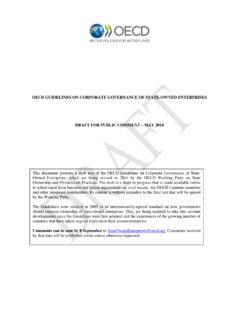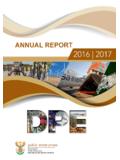Transcription of Corporate governance - OECD.org
1 S the issue?State-owned enterprises (SOEs) play an important role in south africa s economy. This is, to some extent, an outcome of disappointment with the privatisation experience in some sectors. But it is also the result of a growth and development strategy that aspires to diversify the economy and use SOEs to provide quality services and infrastructure that supports private-sector development. In practice, significant parts of the SOE sector have been characterised by chronic under-performance with poor returns on government investments and continuous reliance on government support, whether in the form of explicit government guarantees (estimated to represent 6 % of GDP in 2010) `In south africa , government policies rely on state-owned enterprises as vehicles to support economic development. `However, the most important state-owned enterprises have experienced major governance failures due to weak accountability, excessive politicisation and unclear objectives.
2 `Tackling these challenges would require setting realistic targets for profitability, better accountability with respect to Corporate objectives, and smart regulation to improve competition. ` south africa conducted a comprehensive review of its state-owned enterprise sector in 2012, initiated at the request of the Presidency. Implementation of the review s recommendations is now of critical importance and can be supported by adopting international best practices. or subsidies. In some sectors, SOEs are also perceived to benefit from a favourable market position, which can hinder rather than promote competition and private sector development. Some of these shortcomings can be attributed to major Corporate governance failures, including weak managerial accountability, excessive politicisation and unclear objectives in some of the country s largest and most important effective governance framework will require the state to have a clear overall vision for the role of SOEs.
3 The framework should be backed by company-specific objectives that spell out profitability expectations, 0123456 GBRPERJPNNLDCOLCHLDEUNICBRAKORCANJAMSLVD OMMTLAUSDNKISLBELESPHUNESTMEXAUTHNDSVKNZ LIRLBGRLVAFINPRTLTUGRCITAISRCZEARGSWELUX CRINORZAFCHEFRAROUTURSVNHRVRUSINDPOLCHNP ublic ownership in network sectorsPublic ownership in other sectorsGovernance of SOEsPublic ownership is relatively high in south africa , making better governance of SOEs critical Source: OECD Product Market Regulation database, ownership and SOE governance , index from 0 (best performance) to 6 (worst performance) south africa Policy BriefORGANIS ATION FOR ECONOMIC CO-OPERATION AND DEVELO P M ENTJULY Better Policies SeriesCorporate governance State-owned enterpriSe africa Policy Brief: Corporate governance July 2015capital structure and non-financial objectives that SOEs are expected to deliver. Not only can these elements serve to hold SOEs accountable; transparency around these objectives can increase confidence and predictability, which are key factors for attracting much needed investment and private participation in areas traditionally dominated by the state.
4 Professionalising SOEs boards and management can stimulate long-term Corporate vision, underpinned by objectivity and independence. This can serve to establish a constructive dialogue among the state as shareholder and the company s governing structures. Recurrent and frequent changes in the top management of several of south africa s largest SOEs in recent years point to a problem in this area. Why is this important for south africa ?The size of the state-owned enterprise sector in south africa makes good governance of these firms critical under any circumstances (see Figure). SOEs play a vital role in terms of the direct services they provide. The population s access to water, electricity, sanitation and transportation is almost entirely dependent on the state, operating through Corporate vehicles. In addition, SOEs are among the main sources of urban employment. While SOEs should not play a role as employer of last instance , they can play an important role in upgrading labour skills and raising social standards through appropriate policies of Corporate responsibility.
5 Their importance is further compounded by the fact that they tend to be concentrated in strategic sectors, including infrastructure and utilities ( air and rail transport, energy and water supply, broadcasting, telecommunications), in addition to finance ( banking and insurance) which are crucially important to the competitive position of most of the private sector economy. SOEs also represent an important revenue stream for the government. A recent study found that SOEs total revenues correspond to of GDP. On a sectorial basis, transport ( ), followed by energy ( ), communications ( ), financial services ( ), and water ( ) account for a significant percentage of revenue generated by SOEs. SOEs GDP contributions are to increase in 2015-16 with large-scale investments planned in the state-dominated infrastructure sector. What should policy makers do? `Give priority to setting realistic objectives for SOEs, including profitability, capital structure and non-financial objectives that SOEs are expected to deliver.
6 `Professionalise SOE governing structures and refrain from short-termist political interference. this paper is published under the responsibility of the Secretary-General of the oeCd. the opinions expressed and the arguments employed herein do not necessarily reflect the official views of oeCd member countries. `Privatise state-owned companies, such as telecoms, that are in markets with a sufficient degree of competition. `Promote competition by re-evaluating the prominent position of SOEs, particularly in network industries, which hampers the entry of new firms and increases the costs of intermediate products. `In network industries, complete the introduction of independent regulators and charge them with ensuring non-discriminatory third-party access. `Implement the recommendations of the Presidential Review Committee for readingOECD (2015), State-Owned Enterprises in the Development Process, OECD Publishing. (2015), Revision of the 2005 Guidelines on Corporate governance of State-Owned Enterprises, OECD Publishing, Balbuena, S.
7 (2014), State-owned Enterprises in Southern africa : A Stocktaking of Reforms and Challenges , OECD Corporate governance Working Papers, No. 13, OECD Publishing. (2011), Recommendation of the Council concerning Structural Separation in Regulated Industries, OECD Publishing.
















